2014年3月高级口译真题:听力部分上半场(原文+解析)
2014届高三3月联考英语试题(解析版)
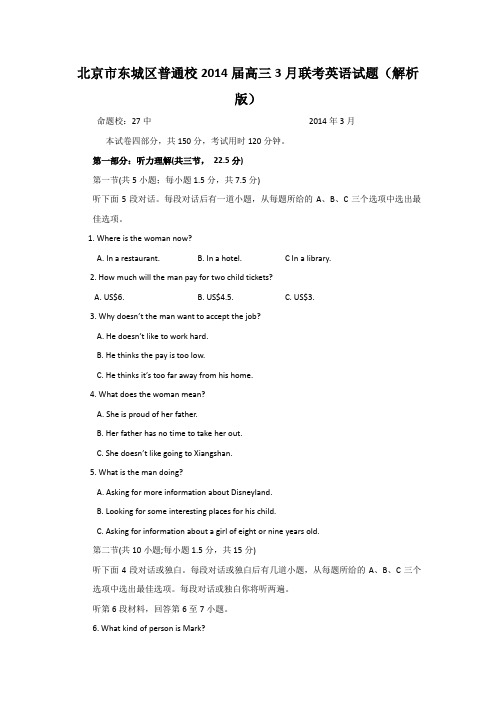
北京市东城区普通校2014届高三3月联考英语试题(解析版)命题校:27中2014年3月本试卷四部分,共150分,考试用时120分钟。
第一部分:听力理解(共三节,22.5分)第一节(共5小题;每小题1.5分,共7.5分)听下面5段对话。
每段对话后有一道小题,从每题所给的A、B、C三个选项中选出最佳选项。
1. Where is the woman now?A. In a restaurant.B. In a hotel. C In a library.2. How much will the man pay for two child tickets?A. US$6.B. US$4.5.C. US$3.3. Why doesn’t the man want to accept the job?A. He doesn’t like to work hard.B. He thinks the pay is too low.C. He thinks it’s too far away from his home.4. What does the woman mean?A. She is proud of her father.B. Her father has no time to take her out.C. She doesn’t like going to Xiangshan.5. What is the man doing?A. Asking for more information about Disneyland.B. Looking for some interesting places for his child.C. Asking for information about a girl of eight or nine years old.第二节(共10小题;每小题1.5分,共15分)听下面4段对话或独白。
14年高考英语听说考试真题C录音原文与参考答案
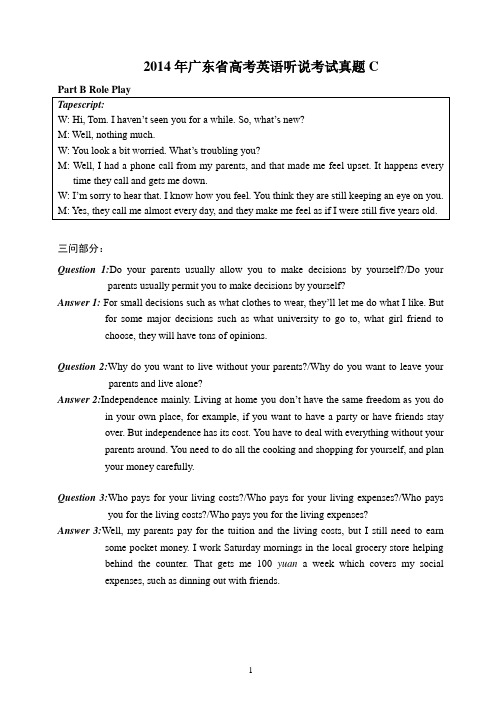
2014年广东省高考英语听说考试真题C三问部分:Question 1:Do your parents usually allow you to make decisions by yourself?/Do your parents usually permit you to make decisions by yourself?Answer 1: For small decisions such as what clothes to wear, they’ll let me do what I like. But for some major decisions such as what university to go to, what girl friend tochoose, they will have tons of opinions.Question 2:Why do you want to live without your parents?/Why do you want to leave your parents and live alone?Answer 2:Independence mainly. Living at home you do n’t have the same freedom as you do in your own place, for example, if you want to have a party or have friends stayover. But independence has its cost. You have to deal with everything without yourparents around. You need to do all the cooking and shopping for yourself, and planyour money carefully.Question 3:Who pays for your living costs?/Who pays for your living expenses?/Who pays you for the living costs?/Who pays you for the living expenses?Answer 3:Well, my parents pay for the tuition and the living costs, but I still need to earn some pocket money. I work Saturday mornings in the local grocery store helpingbehind the counter. That gets me 100 yuan a week which covers my socialexpenses, such as dinning out with friends.五答部分:Question 1:What made Tom feel upset?Answer 1:A phone call from his parents./His parents’ phone call.Question 2:How often do Tom’s parents call him?Answer 2:Almost every day.Question3:Who will probably decide Tom’s choice of university?Answer 3: His parents.Question 4:Where can young people have the freedom to have a party?Answer 4:In their own places./In his own place.Question 5:How does Tom get his pocket money?Answer 5:He works Saturday mornings in the local grocery store./By helping behind the counter in the local grocery store.参考复述:Mary wanted to buy a birthday present for her husband Tom, but she wanted to surprise him. So instead of asking him dire ctly, she asked Tom’s sister to phone him and ask him whathe wanted for his birthday. Then, she could listen to the conversation from the next room. While they were talking, she heard Tom say he wanted a pair of sneakers. Soon after, Mary went to a shop a nd bought a pair of nice new sneakers for him. When Tom’s birthday arrived, Mary gave him the present. Tom opened the package, and looked at the shoes, but he didn’t seem very excited. Mary asked him what was wrong. She said she thought he had wanted a pai r of sneakers. Tom laughed. He said that actually, he’d wanted a pair of speakers.。
历年高口NTGF原文真题
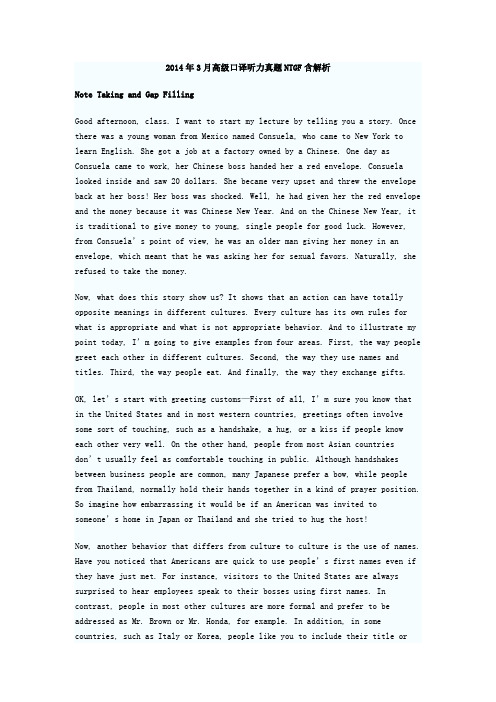
2014年3月高级口译听力真题NTGF含解析Note Taking and Gap FillingGood afternoon, class. I want to start my lecture by telling you a story. Once there was a young woman from Mexico named Consuela, who came to New York to learn English. She got a job at a factory owned by a Chinese. One day as Consuela came to work, her Chinese boss handed her a red envelope. Consuela looked inside and saw 20 dollars. She became very upset and threw the envelope back at her boss! Her boss was shocked. Well, he had given her the red envelope and the money because it was Chinese New Year. And on the Chinese New Year, it is traditional to give money to young, single people for good luck. However, from Consuela’s point of view, he was an older man giving her money in an envelope, which meant that he was asking her for sexual favors. Naturally, she refused to take the money.Now, what does this story show us? It shows that an action can have totally opposite meanings in different cultures. Every culture has its own rules for what is appropriate and what is not appropriate behavior. And to illustrate my point today, I’m going to give examples from four areas. First, the way people greet each other in different cultures. Second, the way they use names and titles. Third, the way people eat. And finally, the way they exchange gifts.OK, let’s start with greeting customs—First of all, I’m sure you know that in the United States and in most western countries, greetings often involve some sort of touching, such as a handshake, a hug, or a kiss if people know each other very well. On the other hand, people from most Asian countriesdon’t usually feel as comfortable touching in public. Although handshakes between business people are common, many Japanese prefer a bow, while people from Thailand, normally hold their hands together in a kind of prayer position. So imagine how embarrassing it would be if an American was invited to someone’s home in Japan or Thailand and she tried to hug the host!Now, another behavior that differs from culture to culture is the use of names. Have you noticed that Americans ar e quick to use people’s first names even if they have just met. For instance, visitors to the United States are always surprised to hear employees speak to their bosses using first names. In contrast, people in most other cultures are more formal and prefer to be addressed as Mr. Brown or Mr. Honda, for example. In addition, in some countries, such as Italy or Korea, people like you to include their title orposition with their family names, especially if they’re university graduates or owners of a business.Now I want to look at eating customs. I’ll talk about the behaviors connected with eating that vary from culture to culture. One of these is the use of utensils. You probably know that people in many Asian cultures use chopsticks but in some countries i t’s customary to eat with your fingers. It’s important to be aware of different dining customs. Here is another example. In some cultures, eating everything on your plate is considered impolite. In Egypt and China, you should leave some food in your dish at the end of the meal. This is to show that your hosts were generous and gave you more than enough to eat. However, Americans generally consider a clean plate as a sign of satisfaction with the food.Finally, what I want to mention today is gift giving, which you may think is a universal custom and there is not much variation from culture to culture. But the rules of gift giving can be very complicated. In USA, if you’re invited to someone’s home for dinner, bring wine or flowers or small item as a present. On the other hand, the Japanese give gifts quite frequently, often to thank someone, such as a teacher or a doctor. In the Japanese culture, gift giving is a very ancient tradition and it has many detailed rules. Another interesting fact about gift giving is that many cultures have strict rules about gifts you should not give. For example, never give yellow flowers to people from Iran, which means you hate them!【评析】本文题材对考生来说并不陌生,是老生常谈的文化差异。
2014年catti三级综合能力口译试题(三)
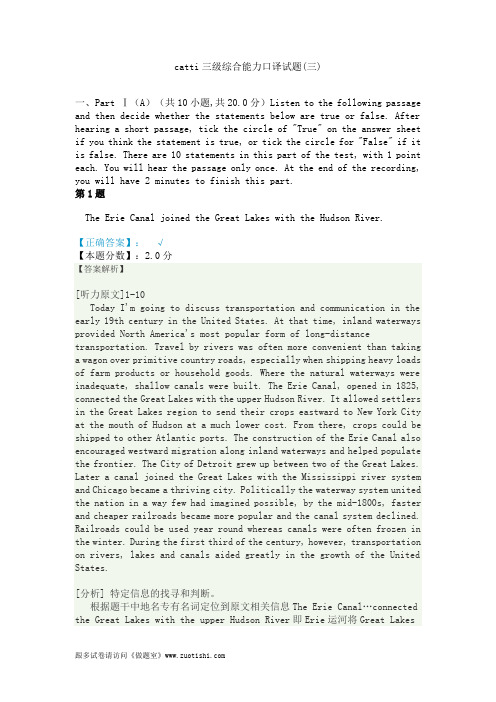
catti三级综合能力口译试题(三)一、Part Ⅰ(A)(共10小题,共20.0分)Listen to the following passage and then decide whether the statements below are true or false. After hearing a short passage, tick the circle of "True" on the answer sheet if you think the statement is true, or tick the circle for "False" if it is false. There are 10 statements in this part of the test, with 1 point each. You will hear the passage only once. At the end of the recording, you will have 2 minutes to finish this part.第1题The Erie Canal joined the Great Lakes with the Hudson River.【正确答案】:√【本题分数】:2.0分【答案解析】[听力原文]1-10Today I'm going to discuss transportation and communication in the early 19th century in the United States. At that time, inland waterways provided North America's most popular form of long-distance transportation. Travel by rivers was often more convenient than taking a wagon over primitive country roads, especially when shipping heavy loads of farm products or household goods. Where the natural waterways were inadequate, shallow canals were built. The Erie Canal, opened in 1825, connected the Great Lakes with the upper Hudson River. It allowed settlers in the Great Lakes region to send their crops eastward to New York City at the mouth of Hudson at a much lower cost. From there, crops could be shipped to other Atlantic ports. The construction of the Erie Canal also encouraged westward migration along inland waterways and helped populate the frontier. The City of Detroit grew up between two of the Great Lakes. Later a canal joined the Great Lakes with the Mississippi river system and Chicago became a thriving city. Politically the waterway system united the nation in a way few had imagined possible, by the mid-1800s, faster and cheaper railroads became more popular and the canal system declined. Railroads could be used year round whereas canals were often frozen in the winter. During the first third of the century, however, transportation on rivers, lakes and canals aided greatly in the growth of the United States.[分析] 特定信息的找寻和判断。
14年高考英语听说考试真题F录音原文与参考答案

2014年广东省高考英语听说考试真题F三问部分:Question 1:What do your parents like about China?/What do your parents love about China?/What are your parents fond of about China?Answer 1: Well, they like music and operas. My mother told me that she was amazed at Beijing Opera, the singing and the dancing impressed her so much. She said shewould like to visit Beijing just for the opera. And my father likes whatever mymother likes.Question 2:Why don’t you buy some Beijing Opera DVDs as gifts?/Why don’t you buy some Beijing Opera DVDs as presents?/Why not purchase some Beijing Opera DVDsas presents?/Why not purchase some Beijing Opera DVDs as gifts?Answer 2:Hey, that’s a good idea. DVDs are easy to carry and they save space. My parents may watch Beijing Opera together at home.Question 3:What gifts do you plan to buy for your brother and sister?/What presents do you plan to buy for your brother and sister?/What presents do you plan to purchase foryour brother and sister?/What gifts do you plan to purchase for your brother andsister?/What gifts do you decide to buy for your brother and sister?/What presentsdo you decide to buy for your brother and sister?/What gifts do you decide topurchase for your brother and sister?/What presents do you decide to purchase foryour brother and sister?Answer 3:That’s tough. My sister is just twelve years old. She likes running. I think I can get her a flying kite, yes, a lovely and fancy flying kite for the little girl. What aboutthe 18-year-old boy? Hmm…he is learning Chinese now and he hopes to visitChina soon. So maybe I can get him a T-shirt printed with some Chinesecharacters. That’ll make a good gift.五答部分:Question 1:How long has Tom been in China?Answer 1:For fourteen months.Question 2:Why was he deep in thought?Answer 2:He thinks about how happy he’ll be to see his family and what kinds of gifts he should bring back from China for everyone./He thinks about how happy he’ll be tosee his family and what gifts he should buy for them.Question3:What might be the reason for Tom’s mother to visit China?Answer 3: She likes Beijing Opera.Question 4:What are the advantages of DVDs as gifts?Answer 4:They are easy to carry and they save space.Question 5:What gift will Tom buy for his sister?Answer 5:A lovely and fancy flying kite./A flying kite.参考复述:Tom is very forgetful and careless with his money. He often forgets his money at school, or finds that his dog has eaten some of his cash. One day, his mother was washing some of Tom’s clothes. She usually checks his trouser pockets before putting them in the washingmachine, but this time she forgot. Tom was reading in another room, when suddenly he remembered he’d had a ten-pound note in his trouser pockets. He quickly ran to his mother and asked her if she’d put his trousers in the machine. She said she had put them in about twenty minutes before. Tom went to the machine and took his trousers out. He finally found the ten-pound note in the pocket of his trousers, but it had lost its color and looked like a piece of white paper. Tom was very disappointed.。
2014年全国高考英语听力卷试题、答案 听力原文
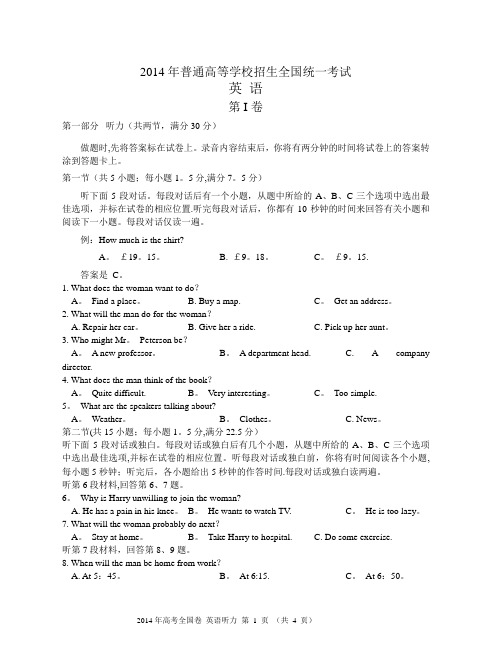
2014年普通高等学校招生全国统一考试英语第I卷第一部分听力(共两节,满分30分)做题时,先将答案标在试卷上。
录音内容结束后,你将有两分钟的时间将试卷上的答案转涂到答题卡上。
第一节(共5小题;每小题1。
5分,满分7。
5分)听下面5段对话。
每段对话后有一个小题,从题中所给的A、B、C三个选项中选出最佳选项,并标在试卷的相应位置.听完每段对话后,你都有10秒钟的时间来回答有关小题和阅读下一小题。
每段对话仅读一遍。
例:How much is the shirt?A。
£19。
15。
B. £9。
18。
C。
£9。
15.答案是C。
1. What does the woman want to do?A。
Find a place。
B. Buy a map. C。
Get an address。
2. What will the man do for the woman?A. Repair her car。
B. Give her a ride.C. Pick up her aunt。
3. Who might Mr。
Peterson be?A。
A new professor。
B。
A department head. C. A company director.4. What does the man think of the book?A。
Quite difficult. B。
Very interesting。
C。
Too simple.5。
What are the speakers talking about?A。
Weather。
B。
Clothes。
C. News。
第二节(共15小题;每小题1。
5分,满分22.5分)听下面5段对话或独白。
每段对话或独白后有几个小题,从题中所给的A、B、C三个选项中选出最佳选项,并标在试卷的相应位置。
听每段对话或独白前,你将有时间阅读各个小题,每小题5秒钟;听完后,各小题给出5秒钟的作答时间.每段对话或独白读两遍。
上海中级口译听力真题2014年3月
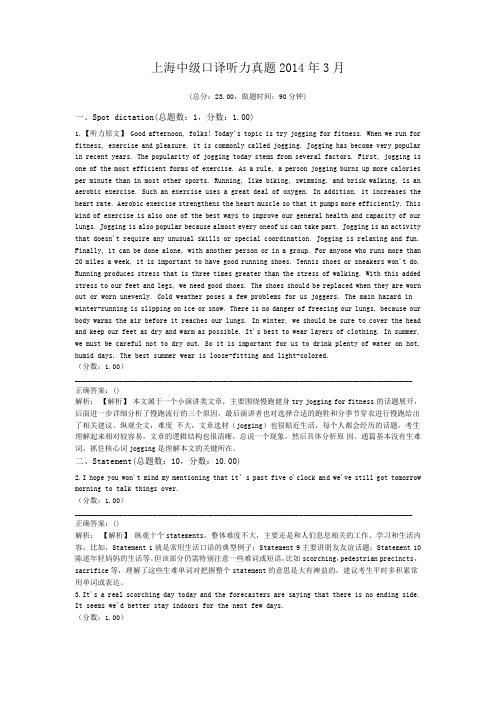
上海中级口译听力真题2014年3月(总分:23.00,做题时间:90分钟)一、Spot dictation(总题数:1,分数:1.00)1.【听力原文】 Good afternoon, folks! Today's topic is try jogging for fitness. When we run for fitness, exercise and pleasure, it is commonly called jogging. Jogging has become very popular in recent years. The popularity of jogging today stems from several factors. First, jogging is one of the most efficient forms of exercise. As a rule, a person jogging burns up more calories per minute than in most other sports. Running, like biking, swimming, and brisk walking, is an aerobic exercise. Such an exercise uses a great deal of oxygen. In addition, it increases the heart rate. Aerobic exercise strengthens the heart muscle so that it pumps more efficiently. This kind of exercise is also one of the best ways to improve our general health and capacity of our lungs. Jogging is also popular because almost every oneof us can take part. Jogging is an activity that doesn't require any unusual skills or special coordination. Jogging is relaxing and fun. Finally, it can be done alone, with another person or in a group. For anyone who runs more than 20 miles a week, it is important to have good running shoes. Tennis shoes or sneakers won't do. Running produces stress that is three times greater than the stress of walking. With this added stress to our feet and legs, we need good shoes. The shoes should be replaced when they are worn out or worn unevenly. Cold weather poses a few problems for us joggers. The main hazard in winter-running is slipping on ice or snow. There is no danger of freezing our lungs, because our body warms the air before it reaches our lungs. In winter, we should be sure to cover the head and keep our feet as dry and warm as possible. It's best to wear layers of clothing. In summer, we must be careful not to dry out. So it is important for us to drink plenty of water on hot, humid days. The best summer wear is loose-fitting and light-colored.(分数:1.00)__________________________________________________________________________________________ 正确答案:()解析:【解析】本文属于一个小演讲类文章,主要围绕慢跑健身try jogging for fitness的话题展开,后面进一步详细分析了慢跑流行的三个原因,最后演讲者也对选择合适的跑鞋和分季节穿衣进行慢跑给出了相关建议。
2014级高三三诊英语参考答案及评分标准
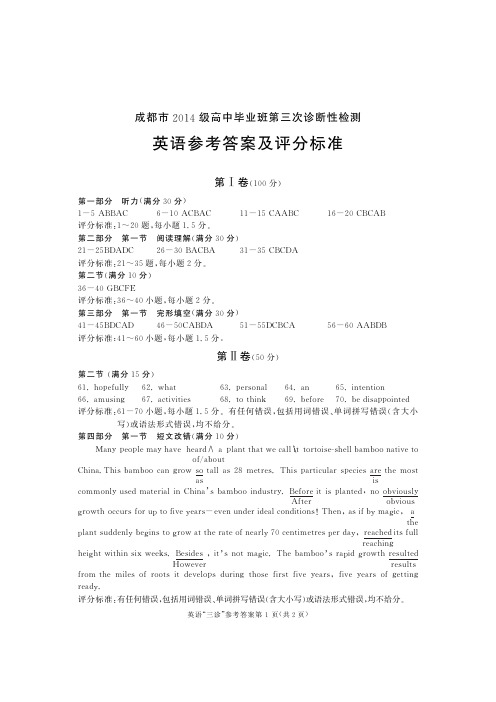
英语 三诊 参考答案第1㊀页(共2页)成都市2014级高中毕业班第三次诊断性检测英语参考答案及评分标准第Ⅰ卷(100分)第一部分㊀听力(满分30分)1-5A B B A C 6-10A C B A C 11-15C A A B C16-20C B C A B 评分标准:1~20题,每小题1.5分.第二部分㊀第一节㊀阅读理解(满分30分)21-25B D A D C 26-30B A C B A 31-35C B C D A 评分标准:21~35题,每小题2分.第二节(满分10分)36-40G B C F E 评分标准:36~40小题,每小题2分.第三部分㊀第一节㊀完形填空(满分30分)41-45B D C A D 46-50C A B D A 51-55D C B C A 56-60A A B D B 评分标准:41~60小题,每小题1.5分.第Ⅱ卷(50分)第二节(满分15分)61.h o p e f u l l y ㊀62.w h a t ㊀㊀㊀㊀㊀63.pe r s o n a l ㊀㊀64.a n ㊀㊀㊀65.i n t e n t i o n 66.a m u s i n g 67.a c t i v i t i e s 68.t o t h i n k 69.b ef o r e 70.b e d i s a p p o i n t e d 评分标准:61-70小题,每小题1.5分.有任何错误,包括用词错误㊁单词拼写错误(含大小写)或语法形式错误,均不给分.第四部分㊀第一节㊀短文改错(满分10分)M a n yp e o p l em a y h a v e h e a r d ɡa ㊀o f /a b o u t p l a n t t h a tw e c a l l i t \t o r t o i s e Gs h e l l b a m b o o n a t i v e t o C h i n a .T h i sb a m b o oc a n g r o ws o a s t a l l a s28m e t r e s .T h i s p a r t i c u l a rs p e c i e sa r e i s t h e m o s t c o mm o n l y u s e dm a t e r i a l i nC h i n a sb a m b o o i n d u s t r y .B e f o r e A f t e r i t i s p l a n t e d ,n oo b v i o u s l y o b v i o u s g r o w t ho c c u r s f o r u p t o f i v e y e a r s -e v e nu n d e r i d e a l c o n d i t i o n s !T h e n ,a s i f b y m a g i c ,a t h e p l a n t s u d d e n l y b e g i n s t o g r o wa t t h e r a t e o f n e a r l y 70c e n t i m e t r e s p e r d a y ,r e a c h e d r e a c h i n g i t s f u l l h e i g h tw i t h i n s i xw e e k s .B e s i d e s H o w e v e r ,i t sn o tm a g i c .T h eb a m b o o s r a p i d g r o w t hr e s u l t e d r e s u l t s f r o mt h e m i l e so fr o o t si td e v e l o p sd u r i n g t h o s ef i r s tf i v e y e a r s ,f i v e y e a r so f g e t t i n g r e a d y .评分标准:有任何错误,包括用词错误㊁单词拼写错误(含大小写)或语法形式错误,均不给分.第二节㊀书面表达(满分25分)一㊁各档次语言要点配分参考标准档次要点数要点分语言要点表达情况划档依据第五档521~25语言基本无误,行文连贯,表达清楚第四档416~20语言有少量错误,行文基本连贯,表达基本清楚第三档311~15语言有一些错误,尚能表达第二档26~10语言错误很多,影响表达第一档10~5只能写出与要求内容有关的一些单词二㊁内容要点认定及计分参考标准1.活动时间及地点(说明清楚㊁表达正确,计6分,其中时间3分,地点3分);2.活动内容(说明清楚㊁表达正确,计11分);3.活动意义(说明清楚㊁表达正确,计8分).三㊁扣分参考依据1㊁其表达未能达成正确句意的,不给分,如:写出了主语或谓语等关键词,但未能达成符合要点要求㊁意义正确的句子;2㊁句子结构完整,但关键点出现错误或漏掉部分关键词,扣半个要点分.如:主谓一致错误,或关键词拼写错误(如主语㊁关键性名词等),或谓语动词时态/语态错误等;3㊁凡使用铅笔答题,或答题中使用了涂改液或不干胶条,一律不给分;4㊁凡多次出现非关键性单词拼写错误或其它同类错误,原则上每4处扣1分;5㊁文章内容要点全面,但写出了一些多余内容(连接或过渡词句不在此列),原则上不扣分;6㊁凡书写超出规定的答题区域,全卷不给分;7㊁书写潦草凌乱,但基本不影响阅卷的,酌情扣卷面分1~2分.四㊁O n e p o s s i b l e v e r s i o nA M e a n i n g f u l S o c i a lA c t i v i t yL a s t S a t u r d a y,o u r c l a s sh e l da m e a n i n g f u l a c t i v i t y s h o w i n g o u rs i n c e r ec o n c e r nf o r t h e e l d e r l y i n t h en u r s i n g h o m e.T h em o m e n tw ew e n t t h e r e,a l l o f u s g o t s t a r t e d i mm e d i a t e l y.S o m e o f u s c l e a n e d t h e r o o m s a n dw i n d o w s c a r e f u l l y,s o m e c h a t t e dw i t ht h e e l d e r l y d e l i g h t f u l l y,a n ds o m ee v e n s a n g b e a u t i f u ls o n g s.T h i s w o n d e r f u la n d h a p p p y m o m e n tl a s t e df o r m o r et h a nf o u r h o u r s.A t l a s t,w e l e f tw i t h f u l l e n j o y m e n t a n d p r i d e,p r o m i s i n g m o r e r e g u l a r v i s i t s.C a r i n g f o ro t h e r si sat r a d i t i o n a lv i r t u e o fo u r n a t i o n.I fe v e r y o n el o v e s o t h e r s u n c o n d i t i o n a l l y,w e c a n s u r e l y m a k e o u r c o u n t r y ab e t t e r p l a c e t o l i v e.(101w o r d s)英语 三诊 参考答案第2㊀页(共2页)。
- 1、下载文档前请自行甄别文档内容的完整性,平台不提供额外的编辑、内容补充、找答案等附加服务。
- 2、"仅部分预览"的文档,不可在线预览部分如存在完整性等问题,可反馈申请退款(可完整预览的文档不适用该条件!)。
- 3、如文档侵犯您的权益,请联系客服反馈,我们会尽快为您处理(人工客服工作时间:9:00-18:30)。
2014年3月高级口译真题:听力部分上半场(原文+解析)第一部分听力(上半场)SECTION 1: LISTENING TEST (30 minutes)Part A: Spot DictationDirections: In this part of the test, you will hear a passage and read the same passage with blanks in it. Fill in each of the blanks with the word or words you have heard on the tape. Write your answer in the corresponding space in your ANSWER BOOKLET. Remember you will hear the passage ONLY ONCE.听力原文:My topic today is how to address the problem of hunger and starvation, which still exists in many parts of the world. To end hunger starts with people's own productivity. A dangerous and patronizing cliche we often hear is: give a man a fish and feed him for a day; teach a man to fish and you feed him for life. People living with chronic hunger have generations of wisdom about'fishing' — the problem is the barbed wire around the lake. The hunger project announced recently by the United Nations cut through the barbed wire, addressing the underlying social conditions that systematically deny hungry people the opportunity they need to end their own hunger. When we invest in a hunger project, we are investing in people's productivity and giving people a chance to translate their hard work into improved well-being. We are ensuring that people get the opportunities which are rightfully theirs. Too often hungry people are isolated, marginalized and exploited. Mobilizing communities and building local organizations is critically important — both to sustain the work we do and to get more out of our precious resources and efforts. When people come together to work, a kind of social capital is created that can compensate for the lack of financial capital in rural areas. In Africa, a unique feature of the hunger project's work is to organize villages to work cooperatively on community land to produce food for food banks. This fosters collective responsibility and action for a better future for all. Another example is in some Asian countries, such as India and Bangladesh, where hunger project volunteer animators have catalyzed the creation of over 1,100 local organizations throughout the country. With nearly 50% ran by women, these local groups create savings programs and invest in individual and collective income generating enterprises, including sowing, tailoring and weaving projects, bakeries and small businesses, fish and poultry farming, bee keeping and plant nurseries. The impact of these enterprises is enormous. As women have become economically empowered, the decision-making roles have increased. As family incomes have often tripled, parents are sending more children —both girls and boys — to school.答案:1.To end hunger2.you feed him for life3.the barbed wire around the leg4.by the United Nations5.systematically deny hungry people6..are investing in people’s productivity7.are rightfully theirs8.marginalized and exploited9.sustain the work we do10. come together to work11. the lack of financial capital12. a unique feature13. on community land14. collective responsibility and action15. some Asian countries16. over 1100 local organizations17. create savings programs18. bakeries and small businesses19. become economically empowered20. family incomes have often tripled解析:本篇以饥饿问题为主题,介绍了由联合国提出的Hunger Project在各国的进展。
所填空格有一定难度,尤其是第3格所填的六个单词“the barbed wire around the leg”,它处在第一段段尾,距离第二段段首的第4格仅隔了五个单词,考生很容易顾此失彼。
但若能在听前纵览全文,较生疏的单词“barbed wire”已经出现在第二段段首,考生能有印象的话,之后听的过程中就不至于猝不及防。
值得欣慰的是,多数长难词的词尾我们在课上进行过大量的练习,比如第6格“investing”中的ing后缀,“productivity”和第14格“responsibility”中的ity后缀,第16格“organization”中的tion后缀。
能在这些长难词上临阵不慌并节省时间,就能从容应付空格中的其它单词。
Part B: Listening ComprehensionDirections: In this part of the test there will be some short talks and conversations. After each one, you will be asked some questions. The talks, conversations and questions will be spoken ONLY ONCE. Now listen carefully and choose the right answer to each question you have heard and write the letter of the answer you have chosen in the corresponding space in your ANSWER BOOKLET.Questions 1 to 5 are based on the following conversation.W: Professor White, I hope I'm not interrupting, but you wanted to see me?M: Oh, hello, Susan. Yes, yes. Come right in. Well, the reason I wanted to talk to you was that while you're presenting your linguistics project in class the other day, I was thinking you're a perfect candidate for the Deans Undergraduate Research Fund.W: Emm... Professor, I am really not sure what that is.M: Undergraduate Research Fundis... It is a mouth for…, I suppose... OK, here is the thing. Every year the school has a pool of money to fund a number of research projects of undergraduate students, because as you can imagine, in-depth research often requires monetary support.W: I would like to expand on my research.M: Good. First, a panel of professors reviews the applicants for the grant, and then they decide which project should be funded. A lot of money could be used for travel expenses to attend a conference for example, or things like supplies, research equipment, resources that are necessary to conduct the research.W: I see.M: Right. And I think you should apply for this grant. Your project is definitely eligible and you can expand it if you haven't necessary resources. So does it sound like something you would be interested in?W: Oh, yeah, sounds great! I thought the topic I work on was very interesting and it is certainly relevant to my linguistics major. I assume it we'll also look good when I try to get into a graduate school, but how do I apply for the grant?M: It is pretty straightforward. A brief description of your proposed project and an estimated budget —how much you need to spend and what you intend to spend it on. Also a glowing letter of recommendation from our linguistics professor wouldn't hurt, which I've been more than happy to write up for you.W: OK, cool! I’m pretty clear on how to carry out my project, but I'm not sure where I can find more information on the subject.M: Well, I've already thought of that. There is this private library at university in Boston. By the way, because I graduated from that school, I can get you access to it, no problem. You see, the library houseslots of unpublished documents that are relevant to your topic.W: So I can put that on the application for the grant that I plan on using material from that library for my research and figure a trip to Boston into my budget?M: Exactly. I really think judging from your work in class and the relevance and clarity of this project, you really have a good chance of getting the funding.W: OK, I'll definitely apply then.M: The sooner, the better. It is due in a few of weeks. And I'll get that letter written up right away.Q1: What is Susan most probably?Q2: What is Susan talking about with Professor White?Q3: Who will decide which project should be funded?Q4: Which of the following cannot be covered by the research fund?Q5: Apart from a brief description of the proposed project and a letter of recommendation, what else is needed for a plan for the grant?解析:第一篇是教授与学生的对话,关于语言学研究项目的拨款申请,具体涉及所需的申请材料,如研究项目的介绍、大致的经费预算、教授的推荐信等等,教授甚至推荐学生去自己在波士顿的母校图书馆搜索所需的资料。
